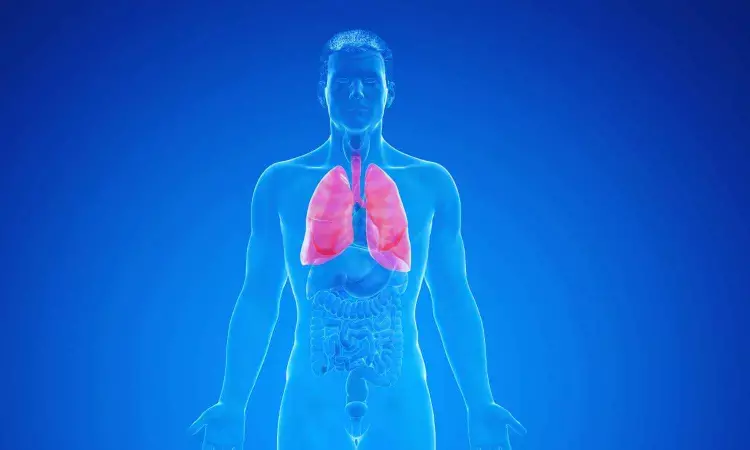- Home
- Medical news & Guidelines
- Anesthesiology
- Cardiology and CTVS
- Critical Care
- Dentistry
- Dermatology
- Diabetes and Endocrinology
- ENT
- Gastroenterology
- Medicine
- Nephrology
- Neurology
- Obstretics-Gynaecology
- Oncology
- Ophthalmology
- Orthopaedics
- Pediatrics-Neonatology
- Psychiatry
- Pulmonology
- Radiology
- Surgery
- Urology
- Laboratory Medicine
- Diet
- Nursing
- Paramedical
- Physiotherapy
- Health news
- Fact Check
- Bone Health Fact Check
- Brain Health Fact Check
- Cancer Related Fact Check
- Child Care Fact Check
- Dental and oral health fact check
- Diabetes and metabolic health fact check
- Diet and Nutrition Fact Check
- Eye and ENT Care Fact Check
- Fitness fact check
- Gut health fact check
- Heart health fact check
- Kidney health fact check
- Medical education fact check
- Men's health fact check
- Respiratory fact check
- Skin and hair care fact check
- Vaccine and Immunization fact check
- Women's health fact check
- AYUSH
- State News
- Andaman and Nicobar Islands
- Andhra Pradesh
- Arunachal Pradesh
- Assam
- Bihar
- Chandigarh
- Chattisgarh
- Dadra and Nagar Haveli
- Daman and Diu
- Delhi
- Goa
- Gujarat
- Haryana
- Himachal Pradesh
- Jammu & Kashmir
- Jharkhand
- Karnataka
- Kerala
- Ladakh
- Lakshadweep
- Madhya Pradesh
- Maharashtra
- Manipur
- Meghalaya
- Mizoram
- Nagaland
- Odisha
- Puducherry
- Punjab
- Rajasthan
- Sikkim
- Tamil Nadu
- Telangana
- Tripura
- Uttar Pradesh
- Uttrakhand
- West Bengal
- Medical Education
- Industry
Elevated Cardiovascular Disease Risks Observed in Idiopathic Pulmonary Fibrosis Patients: Study

A recent study published in the Frontiers in Medicine journal found a pressing concern for patients with idiopathic pulmonary fibrosis (IPF): the condition is strongly associated with a increased risk of cardiovascular (CV) comorbidities, which in turn may influence drug tolerability and overall health outcomes.
The research analyzed data from multiple global sources including PubMed, Embase, Web of Science, Cochrane Library, and China’s Sinomed. The studies published up to April 2025 were examined. The final dataset comprised 28 studies, pooling evidence from 29 case-control or cross-sectional studies and 4 cohort studies. Study quality was rigorously assessed using the Newcastle-Ottawa Scale (NOS).
The findings revealed a consistent and statistically significant link between IPF and cardiovascular disease. The patients with IPF were more than twice as likely to develop CV disease when compared to controls, with an odds ratio (OR) of 2.44 (95% CI 1.84–3.24, P < 0.001). Cohort analyses also pointed to an elevated risk, with a relative risk (RR) of 1.44 (95% CI 1.07–1.92, P = 0.02).
IPF patients showed a 1.14- to 2.51-fold increased risk of developing ischemic heart disease, thromboembolic disorders, pulmonary hypertension, or other cardiac conditions. This indicates that the burden of CV complications is not uniform but distributed across a spectrum of cardiovascular issues, highlighting the complex clinical challenges facing physicians.
Meta-regression and subgroup analyses revealed that several factors shaped the risk estimates. These included the type of control group, data sources, NOS quality scores, diagnostic certainty of CV disease, as well as patient-related factors like body mass index, smoking status, and diabetes prevalence. For instance, the patients with higher smoking rates or comorbid diabetes tended to show stronger associations, which highlighted the interplay of lifestyle and metabolic risks.
The implications are significant for both clinical practice and patient care. Given the higher odds of cardiovascular complications, the findings stress the importance of early and systematic screening for heart disease in individuals with IPF. Moreover, proactive risk-reduction strategies may improve outcomes by preventing compounding health burdens.
Overall, this study marks one of the most comprehensive assessments to date of the relationship between IPF and cardiovascular disease. It suggests that beyond managing lung scarring and respiratory decline, healthcare providers must also consider the systemic impacts of IPF, particularly the cardiovascular dimension.
Source:
Li, Y., Tan, W., Zhang, Y., Cao, F., Wu, Z., Jiao, Y., & Niu, J. (2025). Cardiovascular disease in idiopathic pulmonary fibrosis: a systematic review and meta-analysis of observational studies. Frontiers in Medicine, 12(1653435). https://doi.org/10.3389/fmed.2025.1653435
Neuroscience Masters graduate
Jacinthlyn Sylvia, a Neuroscience Master's graduate from Chennai has worked extensively in deciphering the neurobiology of cognition and motor control in aging. She also has spread-out exposure to Neurosurgery from her Bachelor’s. She is currently involved in active Neuro-Oncology research. She is an upcoming neuroscientist with a fiery passion for writing. Her news cover at Medical Dialogues feature recent discoveries and updates from the healthcare and biomedical research fields. She can be reached at editorial@medicaldialogues.in
Dr Kamal Kant Kohli-MBBS, DTCD- a chest specialist with more than 30 years of practice and a flair for writing clinical articles, Dr Kamal Kant Kohli joined Medical Dialogues as a Chief Editor of Medical News. Besides writing articles, as an editor, he proofreads and verifies all the medical content published on Medical Dialogues including those coming from journals, studies,medical conferences,guidelines etc. Email: drkohli@medicaldialogues.in. Contact no. 011-43720751


